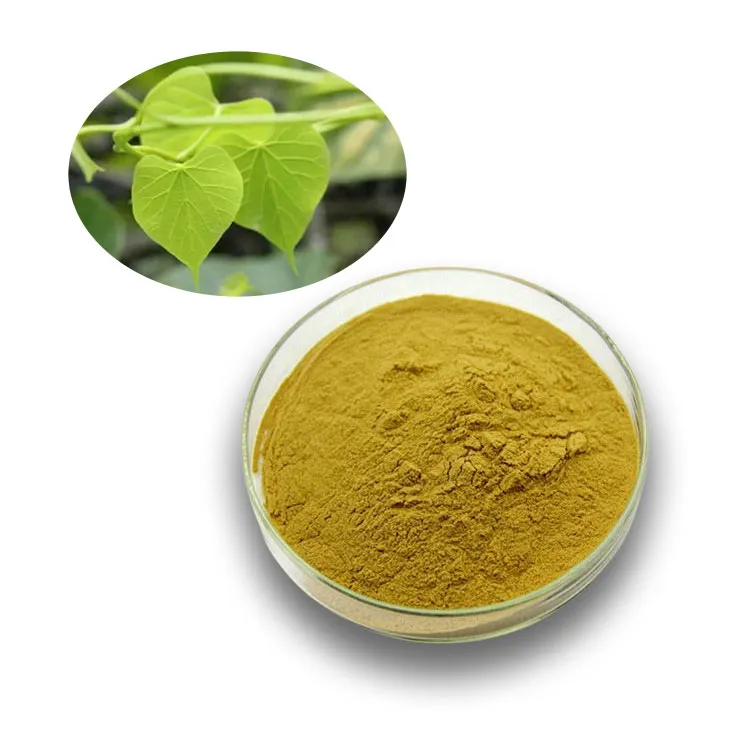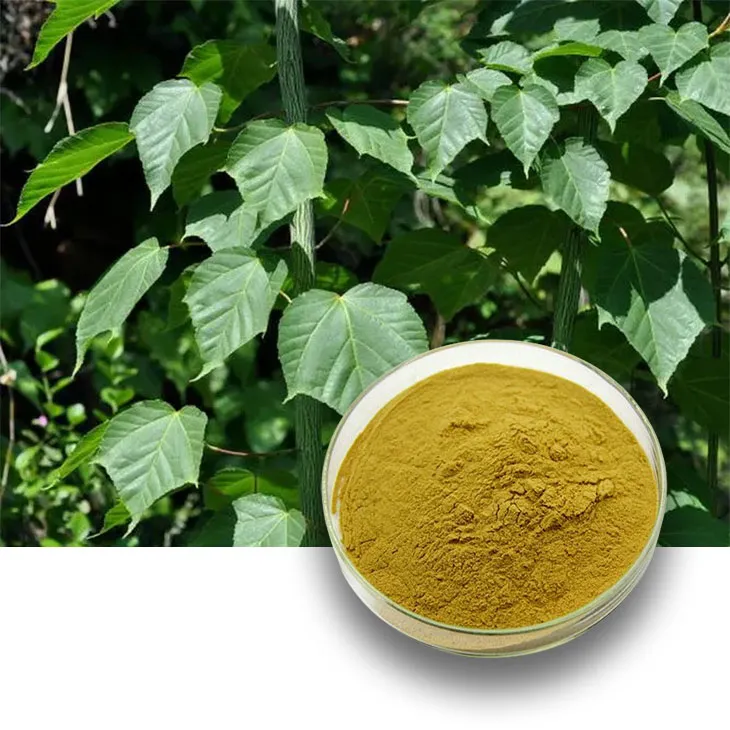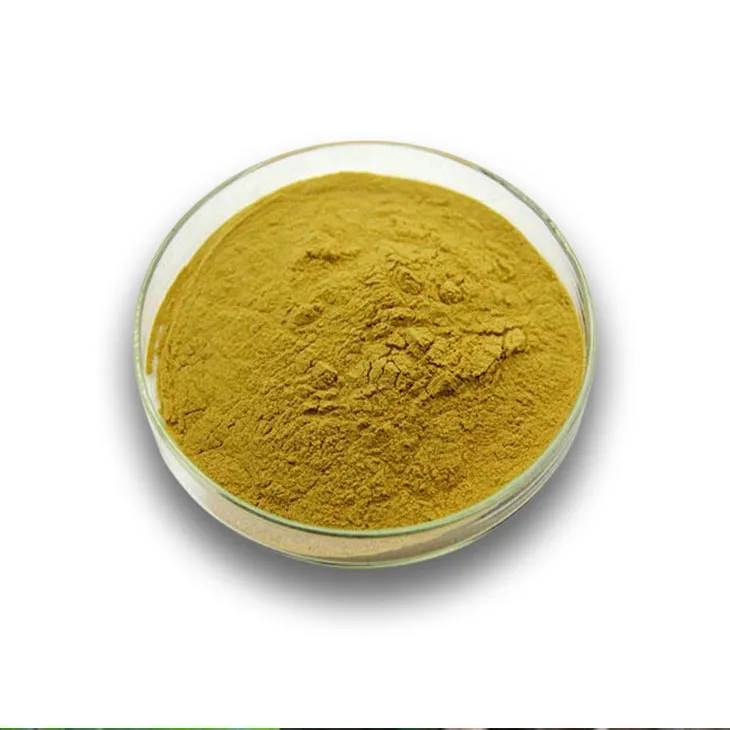- 0086-571-85302990
- sales@greenskybio.com
How do manufacturers of Tinospora cordifolia extracts formulate strategies to launch new products into the market?
2024-12-14

1. Introduction
The market for natural plant extracts such as Tinospora cordifolia extract is becoming increasingly competitive. In order to successfully launch new products, manufacturers need to formulate comprehensive and effective strategies. Tinospora cordifolia, known for its various potential health benefits, has attracted the attention of consumers interested in natural remedies. However, to make a new product stand out in the market, manufacturers must consider multiple factors and develop appropriate marketing and product - related strategies.

2. Product Differentiation
Highlighting Unique Features Product differentiation is a crucial starting point for manufacturers. They should focus on highlighting the unique features of their Tinospora cordifolia extract products. One aspect could be the purity level. A higher purity level can be a significant selling point. Manufacturers can emphasize that their extraction processes ensure a purer product compared to competitors. For example, through advanced filtration and purification techniques, they can offer an extract with a minimum of impurities. This can be especially appealing to consumers who are concerned about the quality and safety of the products they consume.
Another important aspect of product differentiation is the extraction method. If a manufacturer uses a special or proprietary extraction method, it should be prominently promoted. For instance, a novel solvent - free extraction method may not only result in a cleaner product but also preserve more of the active compounds in the Tinospora cordifolia. This could potentially lead to enhanced efficacy of the extract. By differentiating their products based on extraction methods, manufacturers can target consumers who are looking for products with superior quality and unique properties.
Product Packaging and Form In addition to the characteristics of the extract itself, product packaging and form also play a role in differentiation. The packaging should be designed to not only protect the product but also attract consumers. For example, using eco - friendly and sustainable packaging materials can appeal to environmentally - conscious consumers. Regarding the form of the product, manufacturers can offer different options such as capsules, powders, or tinctures. Each form may have its own advantages and target different consumer preferences. For instance, capsules are convenient for on - the - go consumption, while powders can be easily added to beverages or food for those who prefer a more flexible way of taking the supplement.

3. Price - Value Balance
Understanding the Cost Structure Setting a reasonable price that reflects the product's quality and benefits is essential for attracting customers. To achieve this, manufacturers need to have a clear understanding of their cost structure. This includes the cost of raw materials, extraction processes, packaging, marketing, and distribution. By accurately calculating these costs, manufacturers can determine a baseline price that ensures profitability while remaining competitive in the market.
Perceived Value by Consumers It is not enough to simply base the price on costs; manufacturers must also consider the perceived value by consumers. The perceived value is influenced by factors such as the product's effectiveness, brand reputation, and the benefits it offers. For example, if a Tinospora cordifolia extract product has been clinically proven to have certain health benefits, consumers may be willing to pay a higher price for it. Manufacturers can conduct market research to understand what consumers value most in their products and then price their new products accordingly.
Pricing Strategies There are several pricing strategies that manufacturers can consider. One is penetration pricing, where a new product is initially introduced at a lower price to gain market share quickly. This can be effective in attracting price - sensitive consumers and building a customer base. Another strategy is skimming pricing, which involves setting a relatively high price initially for products with unique features or high perceived value. This strategy is suitable for products that target early adopters or consumers who are willing to pay a premium for quality. Over time, the price can be adjusted based on market competition and product lifecycle.

4. Customer Education
Providing Product Information Customer education is indispensable for the successful launch of new Tinospora cordifolia extract products. Manufacturers should provide detailed product information. This includes information about the medical functions of the extract. For example, Tinospora cordifolia is believed to have immunomodulatory, anti - inflammatory, and antioxidant properties. By clearly explaining these functions, manufacturers can help consumers understand how the product may benefit their health.
In addition to medical functions, information about proper usage should also be provided. This includes the recommended dosage, frequency of use, and any potential side effects or precautions. For example, if the extract is in capsule form, the recommended number of capsules per day and the best time to take them should be clearly stated. This helps consumers use the product safely and effectively, increasing their satisfaction and loyalty.
Educational Channels Manufacturers can use various channels to educate customers. One effective way is through the product packaging itself. Clear and concise instructions and information can be printed on the packaging. Another channel is the company's website. Here, more in - depth information about the product, such as scientific research findings related to Tinospora cordifolia, can be provided. Social media platforms are also valuable for customer education. Manufacturers can create engaging posts, videos, or infographics to share product - related knowledge with a wider audience.

5. Market Research
Identifying Target Market Before launching a new product, in - depth market research is necessary to identify the target market. For Tinospora cordifolia extract products, the target market may include health - conscious individuals, those interested in natural remedies, and people with specific health conditions that the extract may potentially address. By understanding the characteristics, needs, and preferences of the target market, manufacturers can better tailor their products and marketing strategies.
Analyzing Competitors Analyzing competitors is another important aspect of market research. Manufacturers need to know who their competitors are, what products they offer, and their marketing strategies. This helps in identifying gaps in the market that can be exploited. For example, if most competitors are offering Tinospora cordifolia extract in capsule form, a manufacturer may consider introducing a powder form to target a different segment of consumers. Additionally, understanding competitors' pricing, product features, and customer service can help manufacturers position their new products more effectively.
Trend Analysis Keeping track of market trends is also crucial. In the natural health product market, trends such as increasing demand for organic products, rising interest in plant - based remedies, and the popularity of personalized nutrition are emerging. Manufacturers should be aware of these trends and incorporate them into their product development and marketing strategies. For example, if there is a trend towards organic products, manufacturers can ensure that their Tinospora cordifolia is sourced organically and promote this feature in their marketing.
6. Brand Building
Establishing Brand Identity Brand building is an important long - term strategy for manufacturers. A strong brand identity helps in differentiating the product from competitors and building customer loyalty. For Tinospora cordifolia extract products, the brand identity can be associated with qualities such as purity, effectiveness, and naturalness. The brand name, logo, and brand messaging should all convey these values consistently. For example, a brand name that evokes nature and health can be more appealing to consumers interested in natural products.
Brand Reputation Management Maintaining a good brand reputation is crucial. This involves ensuring product quality, providing excellent customer service, and being transparent in business operations. For example, if there are any quality issues with the product, manufacturers should take prompt action to address them and communicate with customers openly. Positive customer reviews and testimonials can also help build a strong brand reputation. Manufacturers can encourage customers to leave reviews and share their experiences with the product.
Brand Extension and Diversification Once a brand has been established, manufacturers can consider brand extension and diversification. For example, if a brand is known for its Tinospora cordifolia extract capsules, it can extend the brand to include other related products such as Tinospora cordifolia - based skincare products or herbal blends. This can help increase brand visibility and market share while leveraging the existing brand equity.
7. Regulatory Compliance
Understanding Regulatory Requirements In the production and marketing of Tinospora cordifolia extract products, regulatory compliance is of utmost importance. Manufacturers need to understand the local and international regulatory requirements regarding herbal products. This includes regulations related to product safety, labeling, and claims. For example, in some countries, specific claims about the medical benefits of herbal products need to be supported by scientific evidence.
Quality Control and Certification To ensure regulatory compliance, strict quality control measures should be implemented. This includes testing the raw materials for purity and potency, monitoring the extraction process to ensure consistency, and conducting final product testing. Obtaining relevant certifications such as Good Manufacturing Practice (GMP) can also enhance the product's credibility and marketability. These certifications demonstrate to consumers and regulatory authorities that the product is produced under strict quality standards.
8. Marketing and Promotion
Online Marketing In today's digital age, online marketing is a powerful tool for promoting new Tinospora cordifolia extract products. This includes search engine optimization (SEO) to improve the product's visibility in search engines. By optimizing the product's website with relevant keywords, manufacturers can increase the chances of being found by potential customers. Social media marketing is also important. Platforms like Facebook, Instagram, and Twitter can be used to create brand awareness, engage with customers, and promote product features and benefits.
Offline Marketing Offline marketing still has its place. This can include participating in health and wellness expos, distributing product samples at local health stores, and advertising in relevant magazines or newspapers. For example, at a health expo, manufacturers can set up an attractive booth to showcase their products, provide product demonstrations, and answer questions from potential customers. This can help build face - to - face relationships with consumers and increase brand recognition.
Influencer Marketing Influencer marketing has become a popular trend in recent years. Manufacturers can collaborate with health influencers, bloggers, or experts in the field of natural remedies. These influencers can promote the Tinospora cordifolia extract product to their followers through product reviews, sponsored posts, or educational content. Their endorsement can help reach a wider audience and build trust in the product.
9. Conclusion
Launching new Tinospora cordifolia extract products into the market requires a comprehensive and well - coordinated set of strategies. From product differentiation to price - value balance, customer education, market research, brand building, regulatory compliance, and marketing promotion, each aspect plays a vital role. By carefully formulating and implementing these strategies, manufacturers can increase their chances of success in the competitive market of natural plant extracts.
FAQ:
Q1: What are the key factors in formulating a new product launch strategy for Tinospora cordifolia extract?
There are several key factors. Firstly, product differentiation is crucial. Manufacturers need to emphasize the unique aspects of their extract, like higher purity or special extraction techniques. Secondly, achieving a proper price - value balance is essential. A reasonable price that aligns with the product's quality and benefits helps draw customers. Thirdly, customer education cannot be overlooked. Supplying detailed product information about medical functions and correct usage can boost consumer acceptance and loyalty.
Q2: How can manufacturers ensure product differentiation for Tinospora cordifolia extract?
Manufacturers can ensure product differentiation in multiple ways. They can invest in research and development to achieve a higher purity level during the extraction process. For example, using advanced purification technologies. Another way is to develop and promote a special extraction method that is unique to their product. This could involve using a particular solvent or a new extraction process that results in a different composition or quality of the extract compared to competitors.
Q3: Why is price - value balance important in launching new Tinospora cordifolia extract products?
The price - value balance is important because customers are always looking for value for their money. If the price is too high compared to the perceived quality and benefits of the product, it will be difficult to attract customers. On the other hand, if the price is too low, it may give the impression of low quality. A reasonable price that reflects the product's quality, such as its purity, effectiveness, and the cost of production including research and extraction methods, will make the product more appealing in the market.
Q4: How can manufacturers effectively educate customers about Tinospora cordifolia extract products?
Manufacturers can effectively educate customers in several ways. They can create detailed product brochures or labels that clearly explain the medical functions of the extract. For example, if it has antioxidant or anti - inflammatory properties, these should be clearly stated. They can also provide information on proper usage, such as the recommended dosage and how it should be consumed. Additionally, online resources like a dedicated product website or social media platforms can be used to share more in - depth information, answer customer questions, and even share scientific research related to the product.
Q5: Are there any regulatory considerations for launching new Tinospora cordifolia extract products?
Yes, there are regulatory considerations. Depending on the region, there may be specific regulations regarding the production, labeling, and marketing of herbal extracts like Tinospora cordifolia extract. Manufacturers need to ensure that their product complies with all relevant safety and quality standards. This may include obtaining necessary approvals for production facilities, ensuring proper ingredient labeling, and following guidelines for any health claims made about the product.
Q6: How can manufacturers build brand awareness for their new Tinospora cordifolia extract products?
Manufacturers can build brand awareness in various ways. They can participate in relevant industry trade shows and exhibitions to showcase their products. This allows them to directly interact with potential customers, distributors, and industry experts. Another way is through digital marketing strategies. This includes creating engaging content on social media platforms about the benefits of Tinospora cordifolia extract, running targeted online advertising campaigns, and collaborating with influencers or health - related bloggers who can help promote the product to their followers.
Related literature
- Studies on the Medicinal Properties of Tinospora cordifolia"
- "Extraction Techniques for Tinospora cordifolia: A Review"
- "Market Trends in Herbal Extracts: The Case of Tinospora cordifolia"
- ▶ Hesperidin
- ▶ Citrus Bioflavonoids
- ▶ Plant Extract
- ▶ lycopene
- ▶ Diosmin
- ▶ Grape seed extract
- ▶ Sea buckthorn Juice Powder
- ▶ Fruit Juice Powder
- ▶ Hops Extract
- ▶ Artichoke Extract
- ▶ Mushroom extract
- ▶ Astaxanthin
- ▶ Green Tea Extract
- ▶ Curcumin
- ▶ Horse Chestnut Extract
- ▶ Other Product
- ▶ Boswellia Serrata Extract
- ▶ Resveratrol
- ▶ Marigold Extract
- ▶ Grape Leaf Extract
- ▶ New Product
- ▶ Aminolevulinic acid
- ▶ Cranberry Extract
- ▶ Red Yeast Rice
- ▶ Red Wine Extract
-
Sugarcane Extract
2024-12-14
-
melatonin extract
2024-12-14
-
Grapefruit Seed Extract Powder
2024-12-14
-
Nutmeg Extract
2024-12-14
-
Boswellia Serrata Extract
2024-12-14
-
Eyebright Extract
2024-12-14
-
Dan Shen Root Extract/Salvia Root Extract
2024-12-14
-
Lotus leaf extract
2024-12-14
-
Europen Bilberry Extract
2024-12-14
-
Curcumin Extract
2024-12-14





















